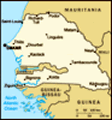Advertisement
Published: September 4th 2007

 Suffolk University
Suffolk University
This is my school! It's right by the ocean.Salaam aleekum! Naka nga fanaane? Jámm rekk? Alxamdulilaay.
Greetings from Dakar, Senegal! (The phrases above are Wolof, and it basically says hi and that I hope you had a good night/good morning)
I’ve been here in the capital of Senegal for about nine days now. The city is a bit crazy: it’s dirty, noisy, crowded, and a lot of fun. There are almost no stop signs and very few stop lights (and most of them don’t work). Sometimes you’ll see a cop directing traffic, but other times, it’s every car for himself and traffic is almost always gridlocked as you work your way downtown. And pedestrians don’t have the right of way. Ever. So we do a lot of sprinting across streets…it’s a lot like being back in Safety Town because you really do have to look left, then right, then left again if you don’t want to die. Sidewalks don’t really exist here either…it’s mostly dirt and rocks and trash strewn on the side of the road. Occasionally you’ll see some semblance of a sidewalk, but it’s either in really bad shape or there are huge, four-foot-deep holes in the middle.
Sometimes we’re going somewhere farther away
and we can’t walk, so we brave the vehicles here in Dakar. None of the taxis here have working meters, so you have to negotiate a fare (in Wolof, because many of the drivers don’t speak much French) before you can get in the car. Often, the cars look like they’re about to fall apart (i.e. the windshield is cracked, the door on one side won’t open, etc) but every taxi looks like that so you can’t be too picky. There are also car-rapides, which are mini buses painted mostly blue and yellow, and they often have religious phrases in Arabic on the sides. These are in about as good shape as the taxis, but they’re super crowded (usually five rows of seats, five people in each row, plus some seats in the back), and the back door is always open with the driver’s assistant hanging out over the street trying to get people to get on. The inside of the van is usually decorated with religious posters, and sometimes there are even ratty curtains! It’s more of an adventure than a practical way of travel, and it only costs 50-100 CFA (about 10-20 cents).
We moved into our

 my first pagne
my first pagne
this is me wearing my first pagne (wrap skirt) host families on Friday, and it’s been a big adjustment for everyone. I’m living in Mermoz (a neighborhood close to the university), with a HUGE, traditional, Muslim Senegalese family. The houses are inside out here, so all the bedroom doors open to the outside. My room is off the courtyard and next to Michelle’s room (she’s another girl in the program). There is one bathroom for the entire family, and there is no mirror and no sink. Instead, there is a faucet in the courtyard that is used for everything from washing hands to washing food to washing feet. The shower isn’t like an American shower…it’s just a shower head sticking out of the wall, so you take a shower and the whole floor (and everything else in the tiny room) gets soaking wet. It’s a bit like camping.
Living with the family is definitely not the easiest thing I’ve ever done. Mama doesn’t really speak French, and Michelle and I know very little Wolof, so it’s hard to communicate with her. Everyone else in the family (except the youngest boy) speaks French, but they mainly speak Wolof in the house. Meal times are equally as difficult. Traditionally, Senegalese

 mmm
mmm
chee boo jen. yummy. families sit on the floor, eat around a bowl and use their hands. Most of our family, luckily, uses a spoon to eat…which is a good thing because I haven’t quite gotten the hang of eating with my hands! There is a ton of etiquette that goes along with eating out of a communal bowl, but it’s hard to keep it all straight, especially when there are 11 adults eating out of one bowl! I’m still trying to get used to the food here. It’s usually rice with either fish or beef for lunch and dinner. Occasionally there will be a carrot or a piece of cabbage thrown in the bowl, but once the carrot is distributed among ten other people, you really don’t get much. My family doesn’t eat dairy products, fruit, fresh vegetables, or sweet foods…it’s so hard! I’m constantly craving cheese and fruit, haha. There are fruit stands on the side of the road, but it’s hard to wash properly and if I eat it at home, I have to share it with everyone. I’m trying to figure out how I can eat my mango without my entire family watching me.
The family itself will take

 my new brothers
my new brothers
and just like real brothers, i often want to strangle them four months to figure out. I’m living with half of a polygamous family (the co-wife lives elsewhere with her children), and the relationships between people are complicated and often no one will tell us how people are connected. We have Mama, who’s probably about 75 or so, and then there are a handful of adults (three of them are Mama’s sons and then their wives, so I guess they’re my host aunts/uncles) who are about 35-50 years old. There is also a girl about my age who is a cousin, but we’re not sure if she actually lives with us or just visits a lot. The door is always open, so neighbors, friends, and other family that lives elsewhere are constantly in the courtyard.
Finally, there are my little brothers. There are four of them, and they’re between the ages of 3 and 8. And much like real brothers, I often want to strangle them. They have no concept of personal space (I often have all four of them trying to sit on me at once), and they have a really hard time understanding that if my door is closed, they can’t come in. Also, here it’s not impolite

 car-rapide
car-rapide
this is the first car-rapide that i rode here in dakar...and i'm still alive!to ask people to give you things. Therefore, my brothers are always like “give me your alarm clock” or “give me your highlighters.” It really is annoying because it seems so rude to me, and they do it constantly. I’ve had to start literally pushing them out of my room to get them to leave so I can do some homework. I do feel bad for them, though, because their mothers don’t pay attention to them unless they’re yelling at them, and they’re pretty much able to go wherever and do whatever they want. The littlest one, however is SO cute. He’s three and his name is Pape and I just love him.
I’m getting more and more used to living here as a minority. The amount of attention the white students get is quite ridiculous. The Wolof word for us is ‘toubab,’ which means a white person, but it usually has the connotation of someone who is rich. While I complain of being a poor college student at home, here I am relatively wealthy comparatively. The average income in Senegal is $900 a year. It is therefore understandable why many Senegalese look at the American students and see dollar signs. We hear ‘toubab’ all the time, whether someone is yelling out “Madame Toubab” to get my attention, or whether it’s a father asking his little girl in French if she has just seen the toubabs as they walk by. People, especially children, are often fascinated by us…they like to touch my hair and poke at my sunburn, and I’ve even had a man reach out and touch my face from a bus window! Men are always telling the girls that we’re so pretty, and we’re often asked if we have boyfriends or husbands. Greetings are very, very important here, so we have to stop and talk to all of our neighbors, who are usually very intrigued by us and love to confuse us by speaking Wolof. A lot of our time is spent meeting new people and trying out our limited Wolof repertoire.
Well, that's about it for now!
Advertisement
Tot: 0.142s; Tpl: 0.009s; cc: 14; qc: 74; dbt: 0.0872s; 1; m:domysql w:travelblog (10.17.0.13); sld: 1;
; mem: 1.2mb







